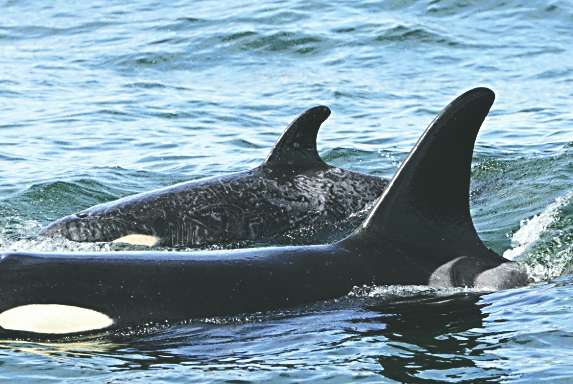She’s one of the best-known orcas on the West Coast.
Her life story was already known as an “unprecedented and unequivocal success” by marine biologists and whale-watchers in two countries.
Now, Springer — the orphaned northern-resident orca rescued from Puget Sound and relocated to Canadian waters back in 2002 — has become a mother for the first time, Fisheries and Oceans Canada officials announced this week.
Dr. John Ford, who heads the Cetacean Research Program based in Nanaimo, B.C., said both 13-year-old Springer and the calf looked healthy.
The calf is believed to have been born this winter, and its gender has yet to be undetermined.
“This is great news for Springer, given all she went through as an orphaned calf, her rescue in Seattle and her successful release back to the wild,” Ford wrote in an email Monday.
Dr. Pete Schroeder of Sequim is the marine mammal veterinarian who coordinated Springer’s capture, rehabilitation and relocation while working for the National Oceanic and Atmospheric Administration, or NOAA.
“That adventure was controversial at the time, and it’s cool that with the cooperation and collaboration of so many people and agencies working together, the greatest indicator of success appeared,” Schroeder said.
Schroeder has traveled to northern Vancouver Island every other year since — five times so far — to study and document Springer’s progress.
In his September 2011 report to NOAA, Schroeder wrote that Springer “gives all indications of living a healthy, normal life since her 2002 translocation.
“It’s most likely that she will calve sometime within the next five years,” he said then.
Schroeder, who now works with the National Marine Mammal Foundation as a consultant for the U.S. Navy’s marine mammal program, said he felt “elation, satisfaction, inspiration and hope” when informed of the milestone Monday.
Springer was spotted with her calf July 4, when sea lion researchers from the University of British Columbia encountered a group of whales near an area called Gosling Rocks.
They reported the sighting to biologists Graeme Ellis and James Pilkington of Fisheries and Oceans Canada, who were able to positively identify the group as members of the A35 matriline, a part of Springer’s A4 pod.
Springer first made headlines 11 years ago, when she was frequently spotted near the Vashon Island ferry dock in January 2002.
A member of the northern-resident orca population native to coastal British Columbia, Springer is believed to have strayed from her pod after her mother died.
Biologists knew that Springer, who already showed signs of undernourishment and disease, was unlikely to be accepted by these distant relatives, as northern-resident orcas are genetically, reproductively and linguistically distinct from Puget Sound’s southern-resident population.
In June 2002, a team of biologists from the U.S. and Canada captured Springer and nursed her back to health in a large ocean pen near Manchester.
After a monthlong rehabilitation period, Springer was transported by boat to the northeastern coast of Vancouver Island and released into the Johnstone Strait on July 14, 2002.
